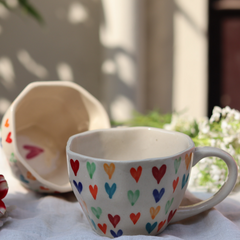Holi is a vibrant and colorful Hindu festival celebrated primarily in India and Nepal, though it has gained popularity in other parts of the world as well. It marks the arrival of spring and the triumph of good over evil. The festival usually falls in March and is celebrated with great enthusiasm and fervor.
During Holi, people engage in various activities including throwing colored powders (known as "gulal") and colored water at each other. It's a time for fun, laughter, and socializing, as people come together to celebrate the joyous occasion. Traditional sweets and special dishes are also prepared and shared with family and friends.
One of the most famous aspects of Holi is the bonfires that are lit on the eve of the festival, known as Holika Dahan. It symbolizes the victory of good over evil and commemorates the tale of Prahlad and Holika from Hindu mythology.
Holi, the festival of colors, is not only about vibrant hues and joyous celebrations but also about indulging in delicious sweets that add sweetness to the festivities. From traditional treats like Gujiya, Thandai, to Malpua, these Holi sweets hold a special place in the hearts of celebrants, bringing families and communities together in the spirit of love and camaraderie.
Whether it's the crispy texture of Gujiya filled with khoya and nuts, the refreshing taste of Thandai infused with aromatic spices, or the softness of Malpua dipped in syrup, each sweet dish carries the essence of the festival, marking the arrival of spring and the triumph of good over evil. 
Savor the Spirit of Holi with These Delicious Recipes
Gujiya:
- Ingredients:
- For the dough:
- 2 cups all-purpose flour
- 4 tablespoons ghee (clarified butter)
- Water for kneading
- For the filling:
- 1 cup grated khoya (reduced milk solids)
- 1/2 cup powdered sugar
- 1/4 cup chopped nuts (almonds, pistachios, cashews)
- 1/4 teaspoon cardamom powder
- Oil for frying
- For the dough:
- Instructions:
- Prepare the dough by mixing flour and ghee until it resembles breadcrumbs. Slowly add water and knead to form a smooth dough. Cover and let it rest for 30 minutes.
- For the filling, mix khoya, powdered sugar, chopped nuts, and cardamom powder in a bowl.
- Roll out small portions of dough into circles. Place a spoonful of filling in the center, fold the dough over to form a semi-circle, and seal the edges by pressing with a fork.
- Heat oil in a deep pan and fry the gujiyas until golden brown. Remove and drain excess oil on paper towels.
- Serve gujiyas warm or at room temperature.
Thandai:
- Ingredients:
- 1/2 cup almonds
- 1/4 cup cashews
- 2 tablespoons poppy seeds
- 1 tablespoon melon seeds
- 1 teaspoon fennel seeds
- 1/2 teaspoon cardamom powder
- 1/4 teaspoon saffron strands
- 1/4 cup sugar
- 4 cups milk
- Instructions:
- Soak almonds, cashews, poppy seeds, melon seeds, and fennel seeds in water for a few hours or overnight.
- Drain the soaked ingredients and blend them into a smooth paste along with cardamom powder, saffron strands, and sugar, adding a little milk if needed.
- Boil the remaining milk in a saucepan. Once it comes to a boil, add the ground paste and simmer for a few minutes.
- Remove from heat and strain the mixture to remove any coarse particles.
- Chill the thandai in the refrigerator and serve cold.

Malpua:
- Ingredients:
- 1 cup all-purpose flour
- 1/4 cup semolina (sooji)
- 1/2 cup sugar
- 1/2 teaspoon fennel seeds
- 1/4 teaspoon cardamom powder
- 1 cup milk
- Oil for frying
- Instructions:
- In a bowl, mix all-purpose flour, semolina, sugar, fennel seeds, and cardamom powder.
- Gradually add milk to form a smooth batter. Let it rest for 15-20 minutes.
- Heat oil in a shallow pan. Pour a ladleful of batter into the hot oil to form small pancakes.
- Fry until golden brown on both sides. Remove and drain excess oil on paper towels.
- Serve malpuas warm with a drizzle of syrup or rabri (thickened sweetened milk).

Conclusion:-
Holi is a multifaceted festival that encompasses a rich tapestry of traditions, including the indulgence in delicious sweets, the symbolic bonfires of Holika Dahan, and numerous other customs.
The celebration of Holi sweets adds a delightful dimension to the festivities, as families and friends come together to savor traditional delicacies like Gujiya, Thandai, and Malpua. These sweets not only tantalize the taste buds but also serve as a symbol of togetherness and sharing, fostering bonds of love and camaraderie among loved ones.
Holika Dahan, the ritual bonfire lit on the eve of Holi, holds profound significance. It commemorates the victory of good over evil and the triumph of righteousness. As the flames of the bonfire rise, they symbolize the destruction of negativity and the emergence of hope and positivity.
Beyond sweets and bonfires, Holi is a time for joyous celebration and vibrant revelry. It transcends barriers of caste, creed, and religion, uniting people in a colorful tapestry of harmony and goodwill.
In essence, Holi is a celebration of life, love, and the enduring spirit of humanity. It serves as a reminder of the power of unity, forgiveness, and the triumph of good over evil. As we come together to celebrate Holi, let us embrace its diverse traditions and revel in the joyous spirit of the festival.


